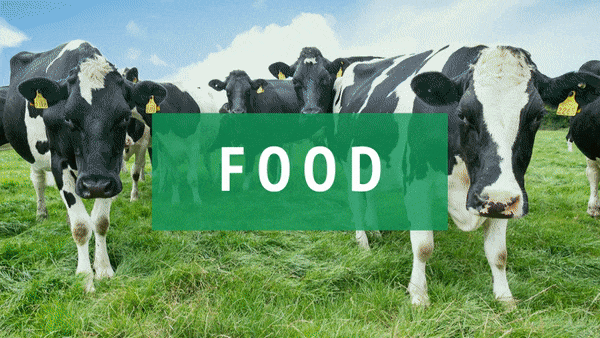
Almost six decades have passed since Rachel Carson’s seminal book, Silent Spring, triggered the modern era of environmental concern. Her poignant warnings about the impact of pesticides made many people around the world question the “wisdom” of intensive farming techniques.
Today, the same fundamental question still hangs in the air: how should we feed the billions of mouths around the planet without denuding the natural “assets” – the soil, the water, the forests – that sustain us?
But climate change now complicates matters considerably. It is sobering to consider recent research which found thatone thirdof human-caused emissions are due to our “food systems”.
Sign upto Carbon Brief's free "Cropped" email newsletter. A fortnightly digest of food, land and nature news and views. Sent to your inbox every other Wednesday.
The decisions we make – from the individual consumer in the supermarket through to governments at international conferences – risk further exacerbating the crisis. Or they could help.
But where we need evidence-based clarity to guide our choices and policymaking, we are typically presented with a thick soup of competing claims, misinformation, emotion and vested interests.
Should we eat organic food? Is it best to be vegan? Could genetically modified crops better withstand climate change? What exactly are “nature-based” climate solutions?
This is why Carbon Brief is now sending out afree fortnightly email newsletter.
It provides a digest of all the key developments from the fraught, yet fascinating intersection between food systems, land use, nature and climate change.
Yes, it’s a huge, complex topic to cover. But Carbon Brief has a team of world-leading journalists – including our food-systems specialistDr Giuliana Viglionein Washington DC and land, food and nature specialistAruna Chandrasekharin Mumbai – who spend each day closely tracking mainstream media, academic journals and policy documents looking for anything that is of significance or interest. This already feeds into our亚慱彩票media digest, but now also helps to shape our fortnightly Cropped newsletter, too.
“Cropped” provides the context behind the headlines, recommended reads and interesting new studies you will have missed.
And lands in your inbox once a fortnight on Wednesday afternoons (UK time).
Past issues
You can find all of the previous issues of Cropped below…
2023
July
- 19 July 2023: EU nature restoration law vote; Deep-sea mining; Extreme weather everywhere
- 5 July 2023: Grain deal fears; Peru deforestation; COP15 catch-up
June
- 21 June 2023: Canada burns; El Niño arrives; Third Pole melts
- 7 June 2023: EU nature law battles; Amazon in focus; Innovate4Climate conference
May
- 24 May 2023: Biggest debt-for-nature swap, AIM4Climate summit; Bahamian ag minister
- 3 May 2023: Record ocean heat; Meat advertising tactics; East African drought
April
- 19 April 2023: Fortress conservation; Ukraine aftershocks; India’s tiger census
- 5 April 2023: Carbon offsets scrutinised; UN water talks; IPCC beef and food fraud
March
- 22 March 2023: Willow project approved; Post-Brexit trade deal; Ocean roundup
- 8 March 2023: High seas; Trees; Wildlife unease
February
- 22 February 2023: Amazon healing; Bird flu; Safeguard Mechanism
- 8 February 2023: UK nature plans; EU-Mercosur talks; US logging ban
January
- 25 January 2023: Carbon offsets controversy; Trade wars; Methane round-up
- 11 January 2023: Brazil under Lula; COP15 reaction; EU deforestation law
2022
December
November
- 24 November 2022: Deforestation pledges; Food systems at COP27; EU fertiliser communication
- 2 November 2022: Brazilian election results; Africa’s weather extremes; Food systems at COP27
October
- 19 October 2022: Gabon’s carbon credits; Living Planet report; Agriculture investigations
- 2022年10月5日:英国’s ‘attack on nature’; Hurricane Ian hits crops; Spike in land defender killings
September
- 21 September 2022: Seabed mining ruling; EU import ban; Hunger on the rise
- 7 September 2022: Pakistan floods; China’s food security; 100 days to COP15
August
- 24 August 2022: Drought deluge; US climate bill tackles farming; Pantanal fires
- 10 August 2022: Food crisis progress; Irish emissions targets; Amazon deforestation investigation
July
- 2022年7月27日:热浪席卷northern hemisphere; Ukraine-Russia wheat deal; Africa’s conservation congress
- 13 July 2022: Valuing biodiversity and wild species; Big meat’s forest pledges digested; Oceans and nature-based solutions
June
- 29 June 2022: Biodiversity talks; WTO subsidies; EU nature law
- 15 June 2022: LEAF Coalition concerns; Kiwis’ carbon pricing; Biofuel boom
- 1 June 2022: Fears for UN biodiversity summit; Food as a war weapon; Commodity flip-flops
May
- 18 May 2022: Great Barrier Reef bleaching unmasked; Food crisis worsens; World begins land negotiations
- 4 May 2022: UN land report; State of the forests; Indonesia bans palm oil exports
April
- 20 April 2022: Wheat deals; Protein sustainability report; Reneging on rainforest promises
- 6 April 2022: IPCC on how land can tackle climate change; UN nature talks end in stalemate; Ukraine’s agricultural crisis
March
- 23 March 2022: War sparks food security fears; Geneva biodiversity talks; Mass coral bleaching
- 9 March 2022: Russia’s invasion of Ukraine; IPCC report; Palm oil deforestation plunge
February
- 23 February 2022: World financing ‘own extinction’; Catastrophic wildfires; Ethanol emissions
- 9 February 2022: Food security fears; ‘Crypto’ carbon markets; Indigenous victories
January
- 26 January 2022: Agribusiness-linked deforestation; India’s forest plantations; European agriculture policy
- 12 January 2022: Brazilian deforestation; Wildfires rage; UK ‘rewilding’ scheme
2021
December
- 15 December 2021: Land and water report; Agribusiness investigations; Rainforest roundup
- 1 December 2021: Brazilian deforestation soars; Fishing subsidy fights; Indian farm laws repealed
November
October
- 27 October 2021: COP26; Committee on World Food Security meets; Climate change in Africa
- 13 October 2021: Biodiversity COP; Palm oil investigation; Food shortages

